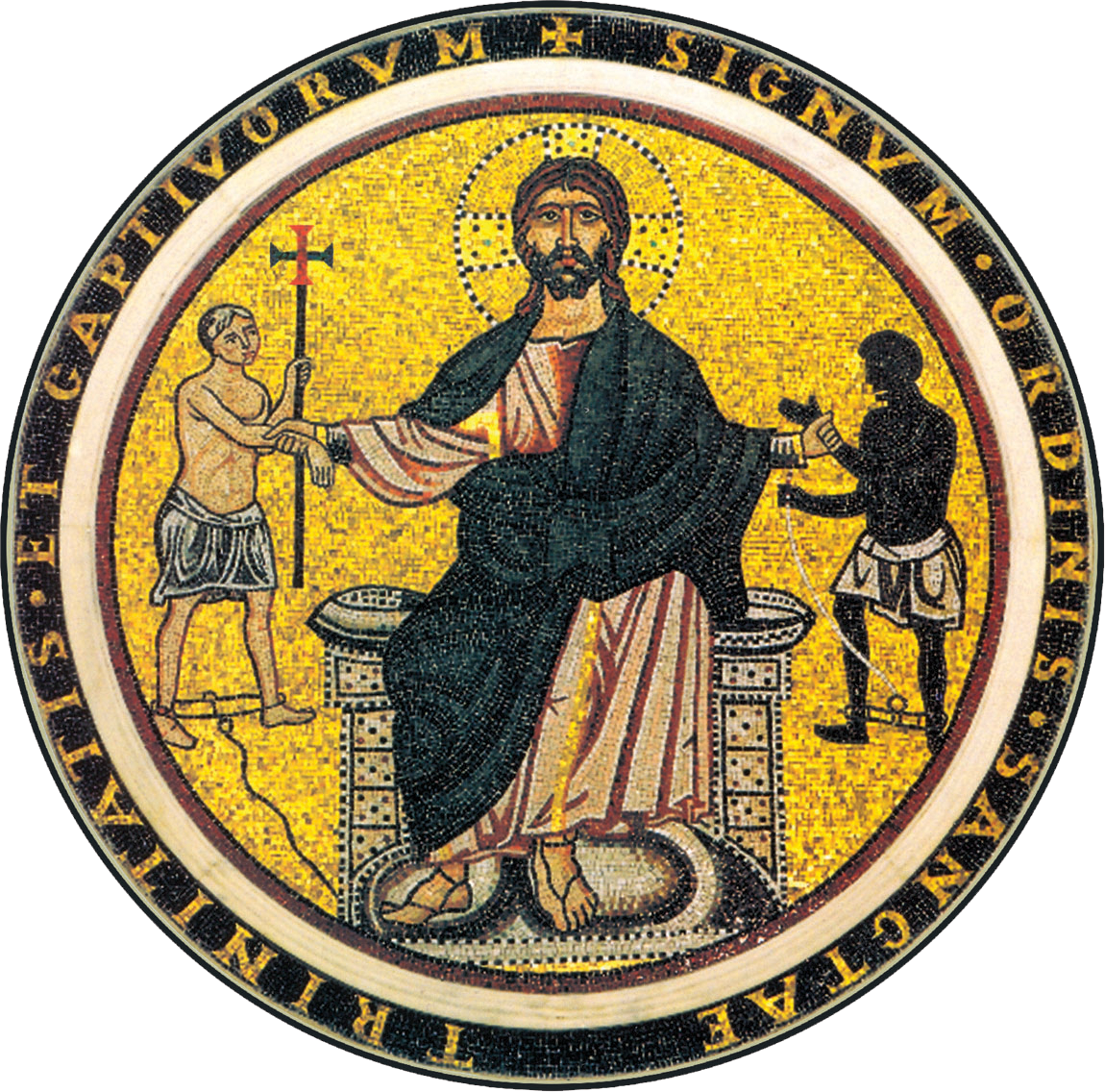MESSAGE OF THE MINISTER GENERAL TO THE TRINITARIAN FAMILY
ON THE OCCASION OF THE SOLEMNITY OF THE MOST HOLY TRINITY
Lit. Circ. 10/2023.
B.S.SS.T
Dear Brothers and Sisters,
May my cordial and fraternal greetings to all the members of the Trinitarian Family.
The Inter-Trinitarian Assembly, held last April, represents a great event not only for those who participated, but for all members of the Trinitarian family, a true gift from Triune God to listen to His voice, discern His will, and concretely witness His presence, placing ourselves at the side of those who suffer, those who are alone, oppressed or abandoned. We have lived an intense experience of Family, where the historical memory of our origins and the first missions of redemption of Christian slaves reminds us of our commitment to those who suffer because of their faith. The challenge ahead of us is to transform this intense experience into a shared path. In this direction, I would like to share with you some reflections looking to the future from our experience.
- The primacy of fraternal communion.
It is not difficult to grasp the symbolic value of our assembly-pilgrimage. We have met to walk together on the roads of the world towards the geographical, cultural, and religious peripheries to bear witness to the Gospel: this assembly is a powerful symbol of our mission in creative fidelity with the charism of our origins.
Only on the ground of fraternal communion can the Trinitarian Family and every expression of it grow. Communion is the heart of our charism, therefore every Trinitarian, lay and religious must be by definition a weaver of fraternity. The specificity and diversity of each vocation must not make us fall into the temptation of each acting on his own. We have a common root that feeds the various branches of the centuries-old tree of the Trinitarian Family. The Trinitarian charism from its very beginnings has been embraced and lived by both religious and laity, each collaborating according to their state of life for the redemptive and merciful mission entrusted by God to our founder and common father St. John de Matha.
Vocational diversity must be at the service of unity, as true unity is realized in giving value to the specificity of each vocation. In this sense, communion is not confusion or uniformity, but harmony of differences.
As Pope Francis reminded us in his message for World Vocations Day, “only in relationship with all the others does each specific vocation in the Church come fully to light with its own truth and richness. In this sense, the Church is a vocational symphony, with all vocations united and distinct in harmony and together ‘going out’ to radiate in the world the new life of the Kingdom of God”[1].
The COPEFAT (Permanent Council of the Trinitarian Family) has the ever more precious task of preserving and growing this symphony within the Trinitarian Family. We have identified two fields of collaboration and mutual enrichment: specific formation and concrete solidarity with persecuted Christians. I invite everyone to foster this collaboration at every level to preserve and grow communion, the true wealth of our religious family. Formation and specific mission make grow our charismatic identity and sense of belonging, even more precious in a time when we live a spirituality and faith without belonging.
- Interculturality as a value and richness of the Trinitarian Family.
The Assembly brought out the cultural diversity of our religious family. The presence of representatives from 22 countries and the diversity of languages and ways of concretizing the Trinitarian charism is a great gift from God that mutually enriches us. The Trinitarian charism has something to say and offer to all cultures, its message of freedom is valid for every geographical context. We can say that the charism of St John of Matha is God’s blessing for every people. At the same time, each culture can concretize the one charism in a new and original way, according to the “fantasy of charity” that the Spirit continually stirs up in the Church.
In a world that builds invisible barriers between people of different cultures and religions, governed by fear of differences, we can offer a great witness of fraternity.
The interculturality that we already experience in religious communities and lay fraternities is a precious gift entrusted to our care and responsibility, to be managed with great delicacy and profound attention, never entrenched in one’s own points of view, but always ready to listen to one another and always attentive to enhance the good present in others. Cultural and religious diversity must never become an insurmountable barrier, but a space for encounter and growth.
- The primacy of encounter
The soul of every family is encounter and sharing. The Christian faith is born from the encounter with the Risen Lord and orients us to the encounter with others.
In this time marked by the crisis of bonds and the weakness of relationships, we are called to bear witness to the richness of encounter and sharing.
Our charism helps us build a culture of encounter and dialogue that helps us defeat the culture of confrontation and every form of closure. It is only by coming out of oneself, out of one’s own enclosure and security, that each of us finds himself and gives meaning to his life. There is no fraternity without encounter.
The Inter-Trinitarian Assembly remains the highest and most significant moment, but there are also many other experiences, some already established, others emerging in different parts of the world. It is becoming increasingly necessary and fruitful to promote these moments of synodality also at the local level, through greater involvement of all and greater listening to one another. Every moment we experience as a family takes precedence over every other initiative and meeting.
- Returning to the origins to look to the future: the creative dynamism of fidelity to the charism.
Come più volte sottolineato durante l’Assemblea intertrinitaria e come ribadito nel documento finale, tornare alle origini non è affatto una operazione di archeologia spirituale, o una vaga nostalgia di un passato mai esistito, ma è ritrovare nell’ispirazione originaria del nostro Fondatore e negli inizi della storia As repeatedly emphasized during the Intertrinitarian Assembly and as reiterated in the final document, going back to the origins is not at all an operation of spiritual archaeology, or a vague nostalgia for a past that never existed, but it is to find in the original inspiration of our Founder and in the beginnings of the history of our religious family passion and courage to make the Trinitarian charism concrete in the contexts in which we work at the service of the Church and the world. It means receiving new sap from the roots so that the centuries-old tree planted by St John de Matha still bears abundant fruit today. As St John Paul II reminded us, we do not have “only a glorious history to remember and to tell, but a great history to build! Look to the future, into which the Spirit is projecting you in order to do even greater things with you”[2]. The memory of the origins is therefore welded to our present commitment and helps us to build the future. Remembrance, commitment, hope recall each other to such an extent that there is no future without remembrance, and we cannot respond to the challenges of the present moment by forgetting both the past and the future that awaits us.
- The vital link between fidelity, communion, and mission.
Fidelity, communion, and mission are mutually reinforcing and can never be separated. Every gesture, word, initiative that goes in the opposite direction to fraternal communion is also a lack of fidelity to our charismatic identity and a lack of witness and credibility in the proclamation of the Gospel.
The mission is also an expression of fidelity to the charism. Furthermore, we must never forget that the subject of the mission is not the individual person but the community. In the mission, no one works in a personal capacity. Fraternal communion is both the source and end of the mission.
The indications that are contained in the final document of the Intertrinitarian Assembly outline our future path and always keep the three dimensions mentioned above united. I invite all religious communities and lay fraternities to carefully read this document in order to put its proposals into practice.
***
In a few days we will celebrate the Solemnity of the Holy Trinity. On this day we will be called to renew “together” the promises made to God on the day of our consecration. It will be a precious occasion to thank the Holy Trinity for all the gifts He has given us, but also to ask forgiveness for our weaknesses and for not having responded generously to His call.
The celebration of the Most Holy Trinity invites us to experience the mystery of God, to let ourselves be illuminated by his light that gives meaning to our lives, to let ourselves be warmed by his fire of love to bring comfort and hope to those who feel alone and abandoned. The mystery of the Trinity reveals to us that God’s oneness is not loneliness, his transcendence is not remoteness, his omnipotence is not crushing power. God is therefore not only eternity, greatness, and fullness but also proximity, mercy, faithfulness, love that never abandons. The Holy Trinity, therefore, reveals to us God’s style that is communion, relationship, love that always tends to embrace every moment of history and every human being. May our communities and fraternities be a true Domus Trinitatis, a stable abode of the Most Holy Trinity, from which everything starts and towards which everything tends. May our witness be “one of the concrete traces that the Trinity leaves in history so that men may feel the fascination and nostalgia for divine beauty”[3]. May our life be a reflection of the boundless love of the great mystery of the triune God. May this great mystery, of which we are called to be heralds and witnesses, be a source of peace and hope for all humanity.
Rome, 21 May 2023
Solemnity of the Ascension of the Lord
Br. Luigi Buccarello O.SS.T.
Minister General
[1] Pope Francis, Message of the Holy Father for the 60th World Day of Prayer for Vocations (April 30, 2023).
[2] John Paul II, Apostolic Exhortation Vita Consecrata, no. 110.
[3] John Paul II, Apostolic Exhortation Vita Consecrata, no. 20.





